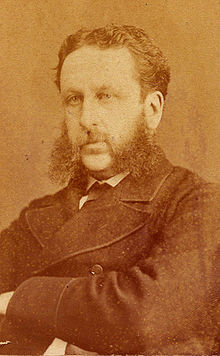- Octavius Sturges
-
Octavius Sturges (1833 - 3 Nov 1895) was a British paediatrician who coined the term "chorea".
Contents
Early life
He was born in London in 1833, the eighth son (hence the name) of John and Elisabeth Sturgesów. He attended King's College School and then was sent to the East India Company's Addiscombe Military Academy, Croydon. After graduation in 1852 he served two years in the army as an officer in the East India Company in Bombay, but his military career ended in his erroneous diagnosis of aortic aneurysm. In 1857 he returned to the UK.[1]
Career
In July 1858 he enrolled at Emmanuel College, Cambridge to study medicine and graduated B.A. in 1861, M.B. in 1863, and M.D. in 1867. He then began practice in St. George's Hospital, becoming medical registrar in 1863. He left to be assistant-physician at the Westminster Hospital in 1868 and became full physician in 1875. He was made assistant-physician to the Hospital for Sick Children in Great Ormond Street in 1873, and full physician in 1884. At the time of his death he was senior physician there and at the Westminster Hospital.[2]
He became a member of the Royal College of Physicians in 1863, and was elected Fellow in 1870. He delivered the 1894 Lumleian Lectures on the subject of heart inflammation in children.
He wrote a number of articles but he is best remembered for his two books The Natural History of Pneumonia (1876) and Chorea and Whooping Cough (1877)
He died in 1895 from injuries received when knocked down by a hansom cab and was buried at Kensal Green Cemetery. He was unmarried.
Publications
The following publications are all by Sturges himself, unless otherwise indicated.
- The Westminster Hospital. "British Medical Journal”, s. 451 (1871).
- The Treatment of Pneumonia. "British Medical Journal”, s. 739 (1873).
- Out-Patients' Medical Relief . "British Medical Journal”, 1 (745), s. 495 (1875).
- Dissolution of the Medical Teachers' Association . "British Medical Journal”, s. 840 (1876).
- Chorea and whooping cough . (1877).
- Abstract of a Clinical Lecture on a Fatal Case of Pneumonia after an Accident. "British Medical Journal”. 1 (948), ss. 300–301 (1879).
- The Nomenclature of Pneumonia and other Allied Lung-Inflammations. "British Medical Journal”, ss. 11–13 (1881).
- On chorea and other allied movement disorders of early life. (1881).
- The heart symptoms of chorea. "Brain” (1881).
- Remarks on some Special Characters of the Present Epidemic of Typhoid Fever in London . „British Medical Journal”, ss. 1239–1240 (1882).
- The Rheumatic Origin of Chorea. "Lancet”. 122 (3141), ss. 808–810 (1883). doi:10.1016/S0140-6736(02)23982-3 .
- Is Collective Investigation Dangerous? . "British Medical Journal”, ss. 483–484 (1884).
- Collective Investigation . "British Medical Journal”, s. 1097 (1884).
- The Collective Investigation Committee . "British Medical Journal”. 2 (1246), s. 985 (1884).
- The Pathology of Acute Pneumonia . "British Medical Journal”, s. 99 (1885).
- Octavius Sturges, Mary Sturges: In the Company's Service: A Reminiscence . (1888).
- Pneumonic Fever, Old and New. "British Medical Journal”, ss. 1030–1031 (1889).
- Octavius Sturges, Sidney Coupland: The natural history and relations of pneumonia: its causes, forms, and treatment, a clinical study. Smith, Elder, (1890).
- The Kindred of Chorea . "American Journal of the Medical Sciences” (1891).
- The Lumleian Lectures on Heart Inflammation in Children: Delivered before the Royal College of Physicians . "British Medical Journal”, ss. 505–510, 561–566, 623–627 (1894).
- Empyema in Childhood . "Lancet”. 143 (3689), ss. 1215-1216 (1894). doi:10.1016/S0140-6736(01)68982-7 .
References
Categories:- 1833 births
- 1870 deaths
- People from London
Wikimedia Foundation. 2010.

